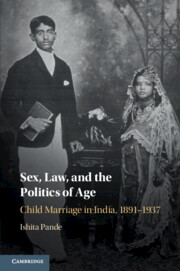Crossref Citations
This Book has been
cited by the following publications. This list is generated based on data provided by Crossref.
Pande, Ishita
2020.
Vernacularizing Justice: Age of Consent and a Legal History of the British Empire.
Law and History Review,
Vol. 38,
Issue. 1,
p.
267.
CHERIAN, DIVYA
2021.
Stolen Skin and Children Thrown: Governing sex and abortion in early modern South Asia.
Modern Asian Studies,
Vol. 55,
Issue. 5,
p.
1461.
Singh, Gagan Preet
2021.
Forensics, body and state power in South Asia: Recent interventions and their importance.
History Compass,
Vol. 19,
Issue. 11,
Mukherjee, Sumita
2021.
Indian child migration in the British Empire.
History Compass,
Vol. 19,
Issue. 8,
Dar, Anandini
2022.
Exploring Children's Suffrage.
p.
111.
Wilkinson, Tom
2022.
The Undisciplined Youth and a Moral Panic in Independent India, Circa 1947‐1964.
Journal of Historical Sociology,
Vol. 35,
Issue. 4,
p.
507.
Bhattacharya, Arnav
2022.
Purging the pornographic, disciplining the sexual, and edifying the public: pornography, sex education and class in early to mid-twentieth century colonial Bengal.
Porn Studies,
Vol. 9,
Issue. 3,
p.
273.
Bauer, Heike
Pappademos, Melina
Sutton, Katie
and
Tucker, Jennifer
2022.
Visual Histories of Sex.
Radical History Review,
Vol. 2022,
Issue. 142,
p.
1.
Ghosh, Nabaparna
2023.
INHERITING caste: the judicial construction of Bengali Kayastha caste identity in inheritance settlements in colonial Calcutta.
South Asian History and Culture,
Vol. 14,
Issue. 3,
p.
336.
Siddiqi, Dina M.
2023.
The Cunning of Gender Violence.
p.
293.
Burton, Antoinette
2023.
New Histories of Gender, Mobility and Labour: India and the Indian Diaspora.
Indian Journal of Gender Studies,
Vol. 30,
Issue. 1,
p.
7.
Arora, Nikita
2023.
The curious case of Patnibrata men: Revisiting masculinity in Sikh and Punjabi reformist literature, c. 1925–1939.
Sikh Formations,
Vol. 19,
Issue. 2,
p.
96.
Sequeira, Rovel
2023.
The sciences of love: Intimate ‘democracy’ and the eugenic development of the Marathi couple in colonial India.
History of the Human Sciences,
Vol. 36,
Issue. 5,
p.
68.
Vashist, Palak
2023.
Childhood and Youth in India.
p.
149.
Sen, Aditi
2024.
The Cambridge World History of Sexualities.
p.
402.
Triadi, Irwan
and
Kayla Sidabutar, Jesamine Margareth
2024.
Penuntasan Sengketa Pilkada Sabu Raijua Provinsi Nusa Tenggara Timur Tahun 2020 oleh Mahkama Konstitusi Resolution of the Sabu Raijua Regional Election Dispute in East Nusa Tenggara in 2020 By .
Indonesian Journal of Law and Justice,
Vol. 1,
Issue. 4,
p.
12.
Balagopalan, Sarada
2024.
On racialized linear time and temporal ‘othering’.
Childhood,
Vol. 31,
Issue. 2,
p.
143.



